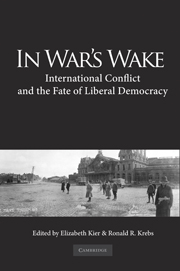Book contents
- Frontmatter
- Contents
- List of Contributors
- Acknowledgments
- 1 Introduction
- PART I WAR AND DEMOCRATIC TRANSITIONS: NEW AND DURABLE DEMOCRACIES?
- 2 Does War Influence Democratization?
- 3 Dodging a Bullet
- 4 Armed Conflict and the Durability of Electoral Democracy
- PART II WAR AND DEMOCRATIC PUBLICS: RESHAPING POLITICAL PARTICIPATION?
- PART III WAR AND DEMOCRATIC STATES: GOVERNMENT BY THE PEOPLE OR OVER THE PEOPLE?
- References
- Index
2 - Does War Influence Democratization?
Published online by Cambridge University Press: 05 June 2012
- Frontmatter
- Contents
- List of Contributors
- Acknowledgments
- 1 Introduction
- PART I WAR AND DEMOCRATIC TRANSITIONS: NEW AND DURABLE DEMOCRACIES?
- 2 Does War Influence Democratization?
- 3 Dodging a Bullet
- 4 Armed Conflict and the Durability of Electoral Democracy
- PART II WAR AND DEMOCRATIC PUBLICS: RESHAPING POLITICAL PARTICIPATION?
- PART III WAR AND DEMOCRATIC STATES: GOVERNMENT BY THE PEOPLE OR OVER THE PEOPLE?
- References
- Index
Summary
Contrarians have been fascinated by the idea that war can lead to progress. In particular, there is a long tradition of viewing war as a midwife of democracy. For Americans raised on the history of the U.S. Revolutionary War, the idea of fighting for freedom seems intuitively plausible. More scholarly analyses note that prosecuting a war requires governments to raise armies and revenue, which places substantial demands on society. In exchange for meeting these demands, citizens in nondemocratic countries have sometimes pressed for an expansion of the franchise, stimulating democratic reforms.
An opposing school of thought, however, notes that in order to wage war countries often militarize society, centralize power, and restrict civil liberties, thereby promoting the rise of authoritarianism and the establishment of garrison states. Although scholars have advanced these competing claims for well over half a century, they have not been thoroughly or conclusively tested. The purpose of our chapter is to help fill this important gap in the literature.
We begin by conducting a statistical analysis of the influence of war on democratization spanning the nineteenth and twentieth centuries. We examine the effects of both interstate and other external wars on subsequent democratic transition, using four different measures of democratization. Our results provide no support for the view that war inhibits democratization; instead, they furnish some scattered support for the view that war promotes democratization.
- Type
- Chapter
- Information
- In War’s WakeInternational Conflict and the Fate of Liberal Democracy, pp. 23 - 49Publisher: Cambridge University PressPrint publication year: 2010
- 6
- Cited by

